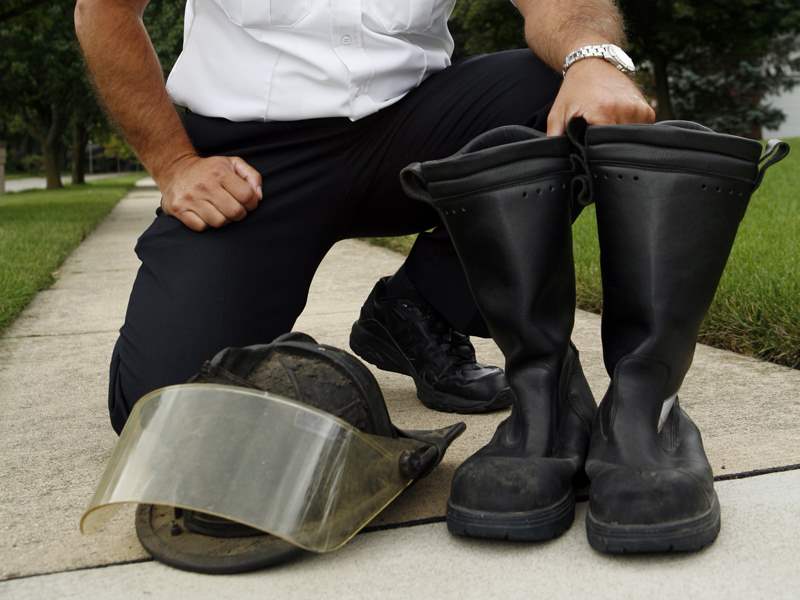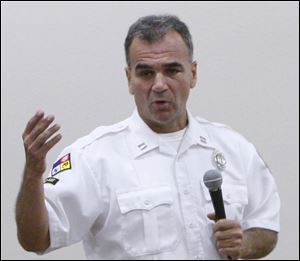
Toledo firefighters joined 9/11 recovery efforts
9/11/2011
Toledo Deputy Fire Chief Phil Cervantes went to New York City after Sept. 11 to help sift through rubble in search of victims. He still has the boots and helmet he wore from that day.
The Blade/Jeremy Wadsworth
Buy This Image

Assistant Fire Chief Phil Cervantes still has the helmet and boots he wore at Ground Zero. Once in awhile, he'll look at them and think about the work he did after 9/11.
Sometimes the smell, the indistinguishable smell, lingers.
And the taste. The indistinguishable taste. It lingers.
This was hell.
The sight of twisted steel beams. The sound of fire crackling and debris falling. The sadness.
"They'll say they found bodies, but more often than not you were finding DNA or what was left of a body. A lot of those people inside were incinerated. They're never going to find them. They'll find a pile of something that was a body. A lot of times they would find a helmet or a coat or a fire boot," said Toledo Assistant Fire Chief Phil Cervantes.
"They did find some bodies relatively intact. We did not. If I hadn't had the training as a firefighter, I don't know that I would ever have been able to identify anything as human remains."
Chief Cervantes and Capt. Rick Syroka were two of the Toledo firefighters who responded after the attacks on the World Trade Center. Responded for their brothers.
Chief Cervantes had just completed a course in Alabama on handling hazardous materials. He was making photocopies of information about Osama bin Laden inside the Toledo Fire and Rescue Department's downtown headquarters when someone said there was an explosion at the World Trade Center.
Captain Syroka was in the department's downtown dispatch office on North Erie Street with the television on.
"I can remember being back and forth -- did it happen by accident? Did it happen on purpose?" Captain Syroka said. "What put a stamp on it was the second tower being hit. It was such a state of unbelievableness. … Did that just happen or was that a replay?"
And so, days later, the firefighters left Toledo for New York City. They only expected to drop off supplies but, "on a whim," took their fire gear, Chief Cervantes said.
"We needed to go find those firefighters and try to bring them out of that hell hole," he said. "That's why we went."
The Toledo firefighters were all confined-space and hazardous-materials trained, the kind of people needed on hand.

Rick Syroka, captain of the Toledo Fire Department's Fire Prevention Bureau, said that while much of what he recovered from the New York rubble after 9/11 was body parts, it was important to assure residents that they were still searching in the hopes of finding survivors.
They spent a week "working the pile," almost exclusively where the north tower once stood.
Shifts were scheduled for 12 hours but typically lasted 14, maybe 16 hours each day. Every time they showed up to work, they were met by a man armed with an M-16 rifle who pointed the weapon at them until they flashed their credentials.
The firefighters were taken through checkpoint after checkpoint. There were snipers on roofs. Military and law enforcement personnel surrounded the site.
Firefighters searched the pile, 70 or 80 feet up, digging with 5-gallon buckets, looking to recover human remains.
"All of a sudden the whole area would become quiet because they would find a body and carry it out and take it to the morgue," Chief Cervantes said. "We never saw 'em, but the bagpipes would come down and play 'Danny Boy' or something. You know, it was tough. I can't, to this day, sit and listen to the songs on the bagpipes."
"It was a mentally draining event. In Toledo I had seen death and pulled bodies out of fires, but that was overwhelming," the chief said.
There was a platform where families, waiting for their loved ones to be found, could watch. When the firefighters passed by, the devastated men and women reached out. Begging, pleading for their husband, their wife, their son, or daughter, to be found.
"A lot of our work was just recovery of body parts," Captain Syroka said. "But at the same time, it was to assure the members of the New York fire and New York police and the public that people were still searching. There was always that hope you might find a body, a full body, so somebody might have closure."
To leave the site, the volunteers were taken through all of the checkpoints, escorted by New York police everywhere they went. A police escort took them to the hotel where they stayed, waited for them to clean up, and drove them to a restaurant for dinner.
"But we were, being typical firefighters, wearing jeans and a T-shirt that said 'Toledo firefighter' and people would applaud," Chief Cervantes said. "You're going from a scene that is just barbaric to this status of something special."
But that wasn't what pushed the firefighters to continue, even after only having one hour, maybe two, of sleep.
It was their brothers.
"We were drawn to that scene because those were our people," Chief Cervantes said. "Even though we weren't New York firefighters, those were firefighters -- 343 of them inside that place. We needed to go there to see if we could find them."
Although 10 years have passed, the firefighters said it seems like just yesterday. The memories are still clear.
Chief Cervantes has tucked away the helmet and boots he wore at Ground Zero. Once in awhile, he'll pull them out, just to touch them, look at them, to think about what he has seen and the work he did.
"It's a curse and it's a blessing," he said. "I tell people, 'You're fortunate you don't know. Consider yourself blessed that you didn't go and didn't have to do the things we tried to do and didn't have to experience those smells and that dust and sadness.'"
But if the phone rang right now, this very second, both Chief Cervantes and Captain Syroka would go again.
"It surely doesn't feel like 10 years," Captain Syroka said. "No, it almost feels like yesterday." He said he read somewhere that since the attacks numerous first responders have died of problems related to working the pile.
"Me, personally, I'm still on a breathing program for my problems that they ruled have been associated with 9/11," the captain said.
The car ride home was quiet. There was a lot of thinking, sleeping, reflecting.
"It's one of those things, there was no place I should have been other than there, but sometimes I wish I'd never gone," Chief Cervantes said. "It's such a difficult … Nobody will ever understand, unless you were there. Nobody will truly understand what it was like."
But it was for their brothers.
Contact Taylor Dungjen at: tdungjen@theblade.com or 419-724-6054.